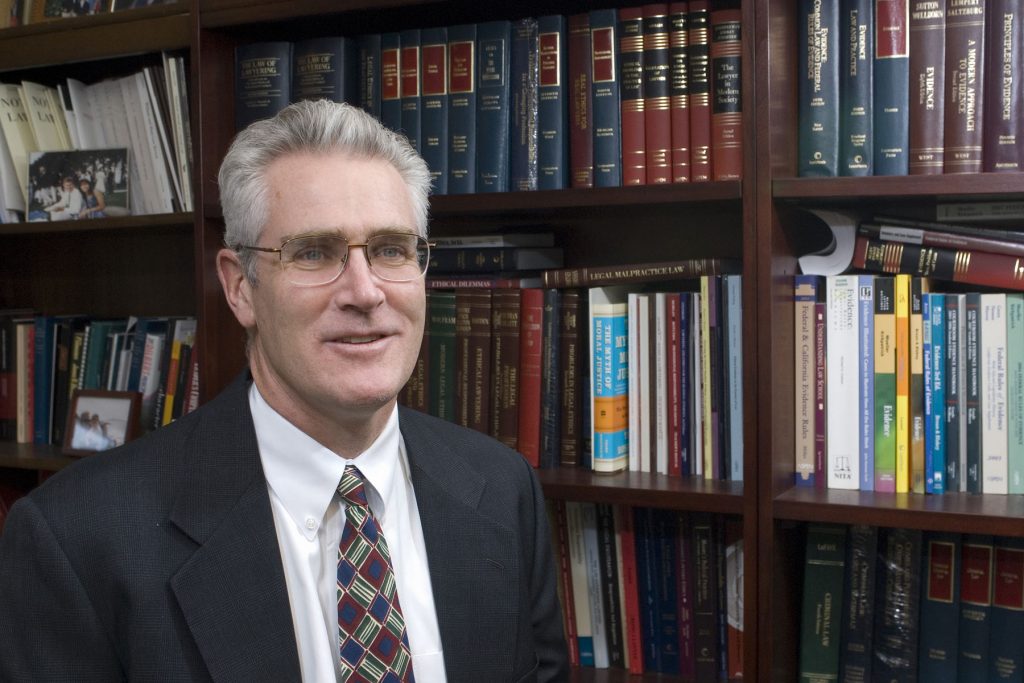As criminal justice reform has made modest legislative gains across the nation over the past few years, Boston College Law School Professor Michael Cassidy has added moral authority to the movement with articles that call for greater ethical and humanitarian consideration by prosecutors when addressing such issues as pre-trial diversion, sentencing reform, reentry preparation, and, most recently, parole.
Cassidy is an expert in prosecutorial ethics and criminal law and procedure. His forthcoming paper, “Undue Influence: A Prosecutor’s Role in Parole Proceedings” in the Ohio State Journal of Criminal Law, has garnered pre-release notice for his position on a matter that few scholars have addressed: the proper role of prosecutors (if any) at parole hearings.
With this new article, Cassidy hopes to keep the pressure on lawmakers in states with parole to move toward presumptive parole in low- and mid-level felonies, to limit the role of prosecutors at parole proceedings, and to encourage more states to take up the federal government’s offer of justice department dollars to work on enhancing correctional programs directed at rehabilitation and recidivism reduction.
Cassidy’s thinking is in keeping with the basic premise of the federal FIRST STEP Act, signed into law in December 2018, which began a shift away from harsh punishment toward policies that address, among other things, prison overcrowding, disproportionate sentencing, and recidivism reduction.
As positive a move as FIRST STEP is, Cassidy views it as the “tip of the iceberg” because it only applies to federal prisoners. In a nation where approximately 2 million people are incarcerated, only one-tenth, or 200,000 of them, are federal prisoners. He asks, “What are we doing with the other 90 percent?”
So Cassidy is zooming in on states where legislators are also demonstrating a willingness to reform their criminal justice systems. In 2018 alone legislators from New York, Massachusetts, Florida, Colorado, Illinois, Louisiana, Oklahoma, California, and elsewhere approved a host of measures designed to punish and rehabilitate, give judges more discretion in sentencing, limit incarceration for de minimis parole violations, and, as Cassidy is advocating for, establish a presumptive parole standard for certain offenses.
This is where the nuance of Cassidy’s recent scholarship enters the discussion. In “Catholic Social Thought and Criminal Justice Reform” published last summer in the Journal of Catholic Social Thought, he examined the implications of fundamental Catholic teaching such as redemption, love, and mercy on our incarceral state in America.
Applying these moral metrics to the role of prosecutors in parole hearings, which is the topic of the Ohio State Journal’s “Undue Influence” article, Cassidy cites ethical rules that “prescribe two very different roles for prosecutors: that of advocates and that of minister of justice.” While he respects prosecutors’ essential legal function as advocates when bringing a case to trial or arguing an appeal, he emphasizes a broader role of “minister of justice” in parole proceedings.
Cassidy urges prosecutors not to interject themselves at all in parole proceedings except in those rare situations where they have new information to offer about the defendant’s past criminal activity or current danger to the public—such as the intimidation of witnesses or the commission of new crimes in prison. Otherwise, prosecutors should stay home and let the parole board do its job in assessing the prisoner’s likelihood to re-offend. Cassidy applauds the work of a handful of states that now prohibit the prosecutor from appearing at parole proceedings except upon leave of the parole board upon a showing of good cause.
“Where the information about the nature and circumstances of the prisoner’s crime is fully known to the board through other resources, there is real danger that submitting testimony—in either oral or written fashion—will be misperceived as advocacy, because it over-emphasizes one aspect of the [parole] board’s consideration to the possible exclusion of others,” Cassidy concludes.
Related scholarship by Cassidy includes “Character and Context: What Virtue Theory Can Teach Us about a Prosecutor’s Ethical Duty to Seek Justice (Notre Dame Law Review), “Sentencing Reform: The Power of Reasons” (Massachusetts Law Review), “Silencing Grand Jury Witnesses” (Indiana Law Review), and “(Ad)ministering Justice: A Prosecutor’s Ethical Duty to Support Sentencing Reform (Loyola University of Chicago Law Journal). He is also the author of the casebook Prosecutorial Ethics.
Read more in the Daily Appeal.


